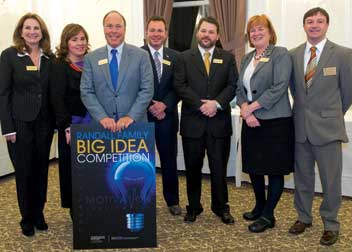‘Big Ideas’ Get a Boost and a New Name From the Randall Family
 From left: Ann Dugan, founder and director of Pitt’s Institute for Entrepreneurial Excellence (IEE); Robin Randall (Bob Randall’s daughter); Bob Randall and his sons, Brett and Chris Randall; Pitt Provost and Senior Vice Chancellor Patricia E. Beeson; and Michael Lehman, IEE director of student entrepreneurship.
From left: Ann Dugan, founder and director of Pitt’s Institute for Entrepreneurial Excellence (IEE); Robin Randall (Bob Randall’s daughter); Bob Randall and his sons, Brett and Chris Randall; Pitt Provost and Senior Vice Chancellor Patricia E. Beeson; and Michael Lehman, IEE director of student entrepreneurship.Bob Randall’s dedication to helping Pitt students formulate new business ideas has helped spur the growth and success of the Big Idea Networking and Awards Event, held by the Institute for Entrepreneurial Excellence (IEE), part of the Joseph M. Katz Graduate School of Business. This year, by renaming the event The Randall Family Big Idea Competition, the competition organizers have recognized the recent and exceptionally generous financial commitment Randall; his wife, Rita; and the Randall family have made to the program.
The new name is also a tribute to the many important previous contributions Randall and his family made to the program, which encourages students to understand, value, and employ innovative thinking in business management and ownership.
Randall says he is very excited about helping young people. He believes it is especially important for retirees to lead and mentor youth, because he is confident that their doing so will, in turn, enable the next generation to help enrich our community.
“I want to see the Pittsburgh region become known for producing outstanding entrepreneurs,” he says. “We can make this happen with our commitment to education, strong communication, ongoing support networks, and access to capital.”
Randall (A&S ’65) is the retired CEO of TRACO in Cranberry Township, Pa., and currently serves as president of RAND Group, Inc., a real estate management and development company.
An active member of the Pitt Board of Trustees, Randall and his family, through the Charity Randall Foundation, sponsored the complete renovation of the main stage theater in the University’s Stephen Foster Memorial. The theater was renamed in 2003 to honor the memory of Randall’s sister, Charity Randall.
Randall strongly believes that Pitt and its students are important assets to the local business community. He also believes that encouraging students’ business pursuits can ultimately be of benefit to the region by encouraging young talented entrepreneurs to establish roots in the greater Pittsburgh metropolitan area.
“Hopefully,” he said, “the Big Idea Competition will attract venture capitalists and other investors who will help keep our young people here, help keep our region vibrant.”
Randall is pleased with the rapid growth of the competition and the steady improvement in the quality of the student entrepreneurs’ ideas and their articulation of those ideas. The competition has attracted significantly greater numbers of entries each year—from 89 in 2009, its first year, to 148 in 2010, to 199 entries this year. The Randalls’ new gift will increase the number of prizes and the dollar amounts awarded in the future.
Ann Dugan (A&S ’82, KGSB ’85), founder and executive director of IEE, is very grateful for all the Randalls have done for IEE and the competition, which, she says, teaches students to meet the challenges of a dynamic business world.
“Equipping students with the practical knowledge and experience to [meet those challenges] is part of what we must accomplish as educators,” she says.
Dugan feels that contributions from a businessperson like Bob Randall are a great way to support that mission.
This year’s competition took place on March 30. Students, who competed for cash prizes in several categories, presented their business ideas to a panel of judges who were also the event’s local business sponsors.
Michael Lehman, IEE’s director of student entrepreneurship, says the program has become more than a competition. Since having come on board in 2009, he says he has helped shape the Big Idea event into an educational process through which students flesh out their ideas over a two-month period.
In the beginning of the process, the students must respond to three questions that address problems they’ve identified, measure the quality of their proposed solutions, and assess the skills of their entrepreneurial team. They then use workshops to help them develop a business abstract, and, finally, they develop a two-and-a-half minute “elevator pitch” to succinctly explain their business idea.
Among this year’s winners is Justin Mares, a student of finance, who says he is pleased that the competition has helped him make connections to grow his business. He also says the cash awards allow a student to change focus from worrying about how to finance the idea to concentrating on its development: “Now I don’t have to ask my parents for help or take on a side job.”
Micah Toll, a mechanical engineering student and three-time Big Idea winner, agrees with Randall that the competition is a great way to help keep young entrepreneurs in Pittsburgh by attracting attention from investors who can support their business ventures.
“Students can realize, ‘Pittsburgh’s a place where I can continue my business,’” Toll says.
Other Stories From This Issue
On the Freedom Road

Follow a group of Pitt students on the Returning to the Roots of Civil Rights bus tour, a nine-day, 2,300-mile journey crisscrossing five states.
Day 1: The Awakening
Day 2: Deep Impressions
Day 3: Music, Montgomery, and More
Day 4: Looking Back, Looking Forward
Day 5: Learning to Remember
Day 6: The Mountaintop
Day 7: Slavery and Beyond
Day 8: Lessons to Bring Home
Day 9: Final Lessons

